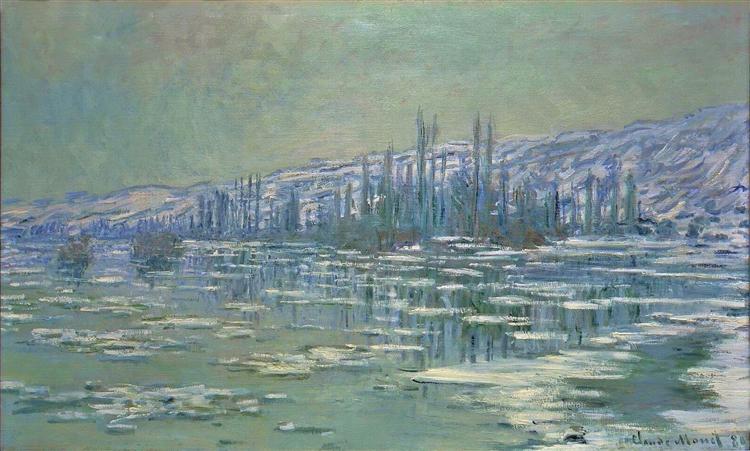תיאור
Claude Monet's Icebergs at Siene (1880) is a masterful depiction of the impact of climate and nature on the landscape, a recurring theme in the French painter's work. Reflecting Monet's interest in capturing the effects of light and atmosphere on the surface of water, this painting is also a manifestation of his intimate connection with the River Seine, a vital element in his creative environment.
Focusing on the representation of water, the work captures a specific moment in time, an instant of transition where icebergs float serenely in a calm current. The composition is built through a series of planes that guide the viewer's gaze from the icebergs, located at the bottom, towards the horizon, where the sky merges with the water. This arrangement establishes a visual dialogue between the cold textures of the ice and the soft hues of the sky, creating a balance that invites contemplation.
The use of colour in this painting is fundamental. Monet deploys a palette that includes shades of blue, grey and white, which intertwine to suggest both the coldness of the ice and the warmth of the sunlight that bathes it. The tonal variations are subtle, but effective, revealing his mastery in the use of the loose brush technique. This technique allows him to capture the ephemeral essence of the scene and emphasise the vibrant luminosity of the winter environment. The surface of the water is depicted with a slight movement, suggesting the fluidity of life, while the icebergs, although fragile, add a sense of temporal permanence to the composition.
It is remarkable how in this work, Monet moves away from the idealization of the landscape to embrace the reality of natural conditions. Unlike other works by his contemporaries, such as those of the Romantic landscape painters, ice is presented as an element that is both beautiful and vulnerable, a metaphor for the transience of time and life itself. The lack of human or animal figures feels intentional, as the viewer is invited to connect with the scene introspectively, absorbing the calm that emanates from this landscape.
"Ice Floes in Siene" is set in a pivotal period of Monet's career, when he was deeply immersed in his studies of light and color. This work can be compared to other works in his river landscape series, such as "Impression, Sunrise" and "The Cathedral of Rouen", where he also explores the interaction between nature and the changing environment. Through these works, Monet lays the groundwork for Impressionism, a movement that values personal perception and sensory experience over exact representation.
The painting is not only an example of Monet's unparalleled talent, but also acts as a witness to the deeply connected relationship between humans and nature, a relationship that is valued even more today. As a whole, Icebergs in Siene is a work that transcends its time, a reflection of the delicate and poetic observation that Monet has made his artistic legacy. His ability to capture the fleeting nature of the moment continues to resonate in contemporary times, inviting new generations to appreciate the sublime beauty of the environment around us.
KUADROS ©, a famous painting on your wall.
Hand-made oil painting reproductions, with the quality of professional artists and the distinctive seal of KUADROS ©.
Painting reproduction service with satisfaction guarantee. If you are not completely satisfied with the replica of your painting, we will refund 100% of your money.

